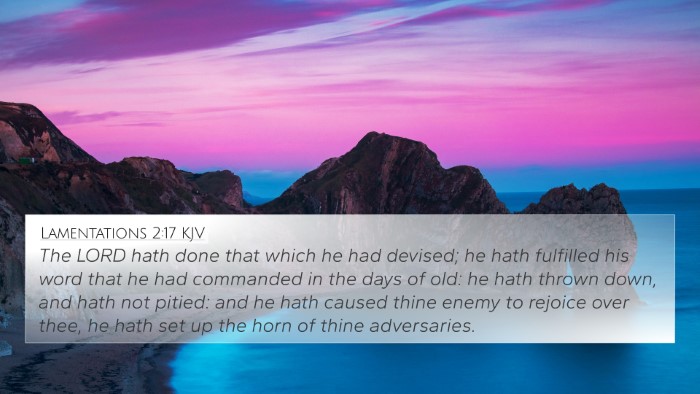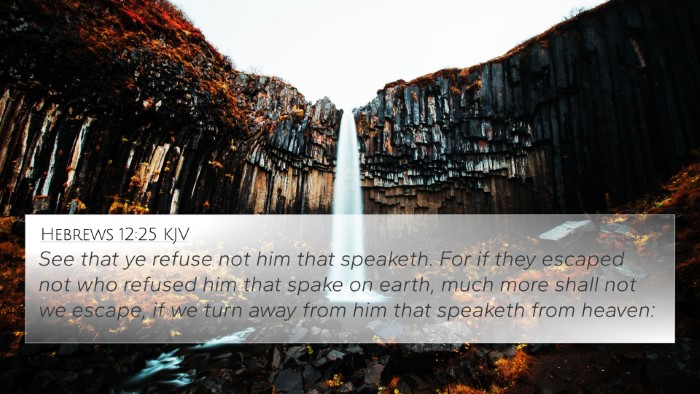Understanding Leviticus 26:14
Leviticus 26:14 states: "But if you will not listen to me and will not do all these commandments." This verse presents a critical warning given by God through Moses to the Israelites about the consequences of disobedience to His commandments.
Contextual Overview
This passage is situated in a larger section where God outlines the blessings for obedience and the repercussions for disobedience. Throughout this chapter, the Lord emphasizes the importance of adhering to His laws as a covenantal requirement, proposing both benefits for faithful observance and disastrous consequences for rebellion.
Commentary Insights
- Matthew Henry's Commentary: Henry points out that the underlying theme of this verse is a call to covenant fidelity. He stresses that the rejection of God's commands leads to severe spiritual and physical consequences, reflecting on the relationship between obedience and divine favor.
- Albert Barnes' Commentary: Barnes interprets the warnings in this verse as a reflection of God's justice. He notes that the disobedience expressed not only disregards God's authority but also results in a withdrawal of His protection and blessings from Israel.
- Adam Clarke's Commentary: Clarke elaborates on the theological implications, asserting that God takes disobedience seriously. He outlines that this warning serves as a prelude to a series of calamities that would pursue the people should they turn away from the covenant established with God.
Theological Themes
This verse spotlights several theological themes relevant to both the Old and New Testaments:
- Divine Covenant: The expectation of obedience highlights the nature of the covenant relationship God establishes with His people.
- Consequences of Sin: The verse emphasizes the serious repercussions of turning away from God’s commandments, a theme prevalent in both Testaments.
- Call to Accountability: It serves as a reminder that individuals and communities are accountable for their adherence to God's laws.
Cross-Referencing Related Scriptures
To better understand Leviticus 26:14, we can look at several related Bible verses that address similar themes:
- Deuteronomy 28:15: "But it shall come to pass, if you do not obey the voice of the Lord your God..." - This passage elaborates on the curses that follow disobedience.
- Jeremiah 17:27: "But if you will not listen to Me...then I will kindle a fire..." - A warning similar to that in Leviticus about consequences for not heeding God's commands.
- Romans 1:18: "For the wrath of God is revealed from heaven against all ungodliness and unrighteousness..." - New Testament reflection on the consequences of sin.
- Galatians 6:7: "Do not be deceived; God is not mocked, for whatever one sows, that will he also reap." - Emphasizing the principle of accountability for one's actions.
- Hebrews 10:26: "For if we go on sinning deliberately after receiving the knowledge of the truth..." - Highlighting judgment upon those who deliberately disobey after knowing the truth.
- Psalm 119:21: "You rebuke the insolent, accursed ones, who wander from your commandments." - A direct correlation in the consequences faced for ignoring God's laws.
- Revelation 3:19: "Those whom I love, I reprove and discipline..." - Illustrates God's response to His people regarding their disobedience.
Practical Application
Understanding Leviticus 26:14 provides insight into the importance of yielding to God's commandments in our daily lives. The consequences outlined serve as a sobering reminder of the covenant relationship we maintain with God.
Believers are encouraged to seek a deeper understanding of God's word and apply His commands, fostering a faithful relationship characterized by obedience and reverence.
Tools for Bible Cross-Referencing
To navigate the complex web of scripture, consider utilizing the following resources:
- Bible concordance: A comprehensive lexicon to find words and themes throughout the scripture.
- Cross-reference Bible study guides: To aid in exploring connections between scriptures.
- Bible reference resources: Tools that compile various references keyed to specific passages.
- Cross-reference systems available in digital formats: Many Bible apps offer built-in cross-referencing tools for deeper study.
Learning Through Cross-Referencing
Effective engagement with scripture often requires a methodical approach to inter-Biblical dialogue. Here are some tips for exploring connections:
- Identify key themes in passages and look for related verses within context.
- Utilize tools such as cross-reference systems and concordances.
- Study the historical and cultural contexts of verses to gain fuller understanding.
- Engage with commentaries that provide different perspectives on the text.
Conclusion
Leviticus 26:14 serves as a powerful admonition about the implications of disobedience in our relationship with God, embodying themes of covenantal faithfulness that resonate throughout scripture. By understanding this verse and its connections to other parts of the Bible, believers can better appreciate the need for obedience and the paths toward a rich spiritual life grounded in God's commandments.










